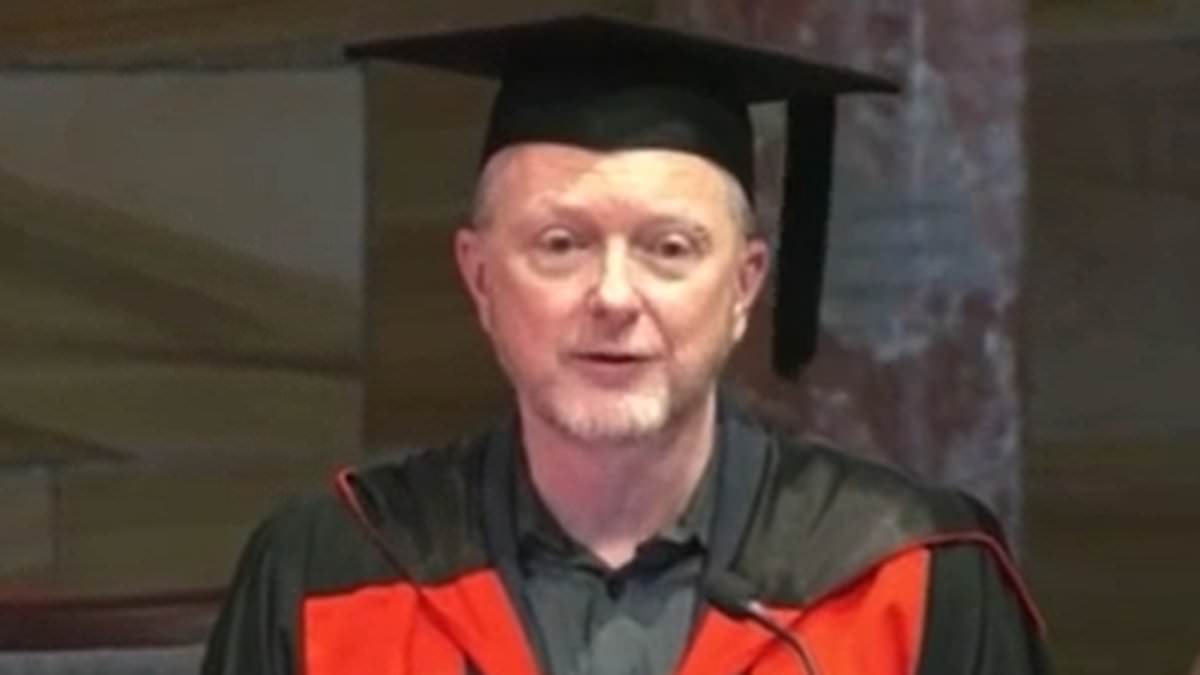A university professor has been criticised for a graduation speech in which he referenced the likelihood of ‘angry blackfellas’ reacting to the defeat of the Voice referendum.
Professor Alan McKee, head of arts, communication and English at Sydney University, told graduating students to use their skills to help First Nations people who would be traumatised and angered by the referendum result.
‘A whole generation of young black fellas has learned that being nice doesn’t work.
‘There’s gonna be a lot of angry young black fellas out there,’ he told the students.
In doing so, Professor McKee was paraphrasing ABC Indigenous Affairs reporter Isabella Higgins, who is a Torres Strait Islands woman.
Professor Alan McKee (pictured centre) told graduating students that Indigenous people would be traumatised and angered by the referendum result and to use their skills to help
The university received no complaints about Professor McKee’s remarks but the family member of one graduating student said it left ‘a sour taste’ in his mouth. Pictured: students listening to the speech
Isabella Higgins (pictured), the ABC’s Indigenous Affairs reporter and a Torres Strait Island woman, said Aboriginal leaders who had spearheaded the Voice had been ‘burned’ by the experience
Ms Higgns believes more Indigenous Australians will now follow the tactics of firebrand Green-turned-Independent senator Lidia Thorpe (pictured)
Ms Higgins said the referendum result was likely to see more indigenous people reject an approach inviting debate because of a historical rejection of black anger.
Instead she believes young Indigenous people may look to voices like Lidia Thorpe, who is often confrontational in public and now leads a growing black sovereignty movement, as an example.
A man whose relative was graduating called into Ben Fordham’s 2GB radio show to complain that the graduation ceremony had been ‘hijacked’.
He said Professor McKee’s speech left a ‘sour taste’ in his mouth, though his graduating relative was not upset by it.
‘It was very cringey to sit through especially seeing as 60 per cent of the population made their mind up… it was a bit insensitive to bring it up during a time of celebration,’ the caller said.
It is understood there have not been any complaints directed to Professor McKee or officially lodged to the faculty about the speech.
Professor McKee urged graduating students to respect the fact that Indigenous people would be hurting after the referendum.
‘A First Nations colleague told me that she cried for 24 hours… there’s gonna be a lot of hurt and a lot of trauma.
‘But first nations people in this country have survived a lot worse and [their] communities are proud and strong.
‘So as non-indigenous people I think it’s our job to do everything we can to help first nations Australians (over) what comes next…’
Black anger has already been expressed since the Voice proposal was resoundingly defeated 10 days ago.
‘October 14 was a moment in history that will forever cast a dark shadow,’ said Aboriginal rapper Nooky on his Triple J radio show the day after the vote.
He said Indigenous people would now be ‘sharpening our spears’.
‘Last night was the most overt unconcealed manifestation of racism I have ever experienced in my whole life. Yesterday they said our pain and our suffering continues.
‘We all knew what the outcome was gonna be, we all know the reality that we live in. It’s just now more apparent.
‘We ain’t licking our wounds today, we’re sharpening our spears.’
Ms Higgins says Aboriginal people may treat the rest of Australia differently and no longer hold in their ‘black anger’ after the failed Voice to Parliament referendum.
Isabella Higgins made her comments during an interview on the Insiders on Sunday – the day after Australia voted No to enshrining an Aboriginal Voice into the constitution.
Ms Higgins, the public broadcaster’s Indigenous Affairs reporter, said Aboriginal leaders who had spearheaded the Voice had been ‘burned’ by the experience.
‘When we’re talking about reconciliation we use kind language, we’re generous, we extend the hand of friendship, we invite people to share in our culture,’ she said.
‘So I think this failing, this being rejected so categorically by all Australians it will change the way indigenous Australians want to interact with the rest of the country.
‘It will change whether kindness is the best approach.’
The University of Sydney ‘strongly defended’ Professor McKee’s comments and said ‘freedom of speech’ was a key issue in doing so.
Indigenous actor Deb Mailman with Corey Webster, aka Nooky, from Triple J
‘Graduations at universities around the world have a long tradition of featuring thought-provoking speeches designed to celebrate success, inspire reflection and motivate students to consider a better future,’ Sydney University said in a statement.
‘That’s what Professor McKee did with this part of his speech: following an acknowledgement of country, he shared with the audience the responses he’d heard from First Nations friends and colleagues on the previous weekend’s Voice referendum results, and encouraged our graduates to use the skills they’d learned to support First Nations’ communities and aspirations.
‘As a University, we serve as a platform for debate and discussion and are deeply committed to academic freedom and the safe and legal expression of free speech.
‘We strongly defend the right of Professor McKee to express his opinions, and of the audience to express their own varied views.’
